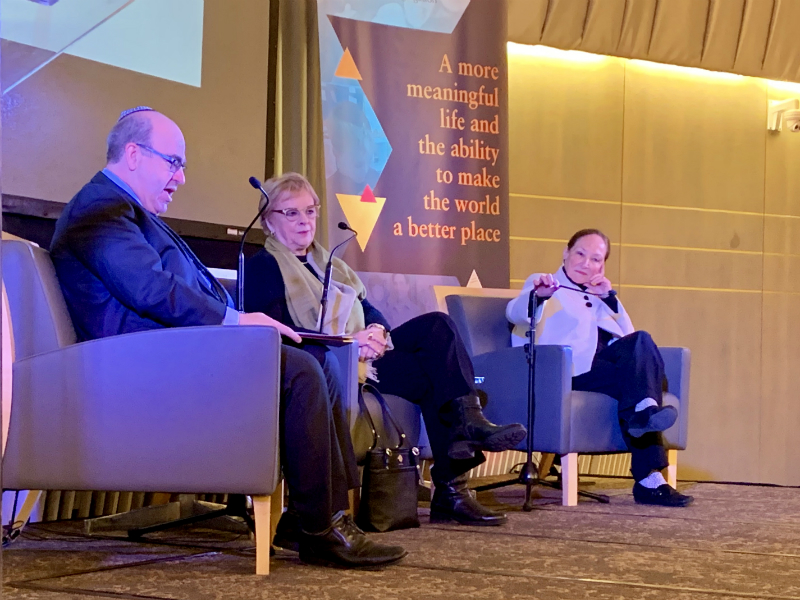An independent judiciary is critical to upholding minority rights, yet Israel’s strong court system is under attack from many of the country’s political elite, according to Supreme Court Justice Rosalie Abella and Dorit Beinisch, the former president of the Israeli Supreme Court, who took part in a panel discussion in Toronto.
Over 650 people gathered at Beth Tzedec synagogue on March 24, to hear the two speak about the role that courts play in a free and democratic society.
The event was one of a number that are being held to mark the retirement of the synagogue’s senior rabbi, Baruch Frydman-Kohl, who will step down this summer after 26 years on the job.
The justices both stressed how important it is for the courts to remain independent from politics. In democracies, political pressure will, by definition, generally come from the majority. But it is incumbent upon the courts to protect the rights of the minorities, they argued.
“If you parse democracy as what it is, the most important part of democracy is having somebody there to say, ‘Majority, no. What you’re trying to do is bad for society,’ ” said Abella, before listing multiple countries where authoritarian regimes have been validated by majorities at the ballot box.
“It’s happening all over the world and we’re supposed to say it’s none of our business.… We already saw in our lifetime the consequences of ignoring that,” she continued, to applause. “We will not be silenced by people who say it’s none of your business. It is all of our business.”
Beinisch and Abella both have impressive resumes, even for Supreme Court justices. Abella became the youngest judge in Canadian history in 1976 and was the first Jewish woman to serve on the Supreme Court. Beinisch was Israel’s first female state attorney and the first woman to be appointed president of the Israeli Supreme Court.
Beinisch joked that she only became a judge because other political players didn’t want her around once her term as state attorney came to an end. “They thought the quickest way to (remove) my influence there is to send me to the Supreme Court,” she said.
READ: RUTH BADER GINSBURG PLANS TO SPEND 5 MORE YEARS ON SUPREME COURT
The two justices also spoke about the difference between the judicial system in Canada, where commentators and politicians may disagree with a ruling but respect the institution that administered it, and Israel, where politicians are actively trying to undermine the independence of the court.
“The Israeli court became very strong in the eyes of politicians because of its independence, because we really don’t have to be popular in very difficult situations – when the state fights terror, when we have so many problems,” said Beinisch. “This is a tension that we know everywhere. The situation in Israel became more and more difficult.”
For example, Israeli politicians Nafatali Bennett and Ayelet Shaked want to curb the power that the country’s courts have over the Israel Defence Forces.
Abella said that she admires her colleagues who work in the Israeli judicial system, because they are able to do their jobs with so many external forces working against them.
“The Israeli supreme court is under regular and constant siege, rhetorical siege, from people who are trying to undermine its legitimacy, precisely because it’s doing its job properly and trying to make sure that the country’s feet stay close to the fire of morality and values that they started with,” she said.
Abella gave a lecture in Jerusalem in April 2018 on the independence of Israel’s courts that touched on many of the same themes as her panel discussion with Beinisch.
“Patriotism means upholding the values on which your country is based. Those values in Israel are Jewish and democratic. They include respect for human rights, tolerance, equality and dignity. That is what being patriotic means. Yet in championing those values, the Israeli judiciary finds itself demonized by some for being independent from political expedience and immune to political will,” Abella said in her lecture last year.
Throughout the evening, Abella and Beinisch constantly found themselves echoing each other’s points on the importance of a strong and independent judiciary that protects the rights of minorities.
“You know, we are not the best panel, because we agree on everything,” Beinisch joked at one point.
“That’s my favourite kind of panel,” replied Abella.
